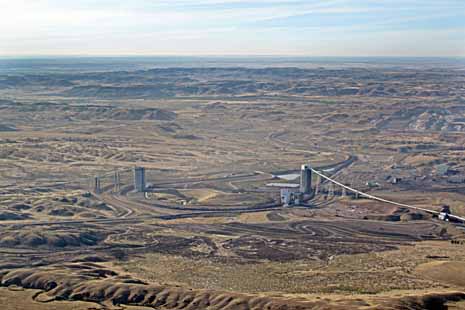Land use plans to keep open vast amounts of public land in Montana and Wyoming for fossil fuel development are short-sighted and fail to consider dramatic changes in energy markets that make such thinking both obsolete and financially risky, a coalition of conservation groups contend in a lawsuit filed March 15.
WORC and member groups Powder River Basin Resource Council and Northern Plains Resource Council joined with Natural Resources Defense Council (NRDC), Sierra Club and the Montana Environmental Information Center in the suit. The groups are represented by attorneys with NRDC, Sierra Club, and the Western Environmental Law Center.
The Bureau of Land Management’s (BLM) final Resource Management Plans (RMPs) for the Buffalo, Wyoming and Miles City, Montana field offices call for keeping open more than 10 million acres of land for oil and gas drilling and coal mining in the Powder River Basin. The RMPs pave the way for an expected 11 billion tons of coal to be mined and an expected 18,000 new oil and gas wells to be drilled. More than 81 billion tons of coal would be available for mining under the land use plans.
Land use plans inadequate
The groups allege the BLM’s final RMPs, approved in Sept. 2015 for the Buffalo and Miles City field offices, violate the National Environmental Policy Act by failing to adequately consider the impacts of increased fossil fuel extraction on Montana and Wyoming’s land, air, and water resources, as well as the global climate.
In addition to long term climate concerns raised by the plan, the groups also raise concerns with the plans’ direct impacts on air, water, and wildlife resources of the Powder River Basin.
“The documented rise in ground level ozone that follows oil and gas work could become harmful to the area’s agriculture sector and human health pretty quickly,” said Bob LeResche, chair of the Powder River Basin Resource Council and a WORC board member. “Meanwhile, coal mining destroys coal seams that function as aquifers, dewaters streams, and discharges polluted mine water to surface waters.”
The suit also contends that BLM’s analysis of the impacts of coal leasing and mining is inadequate. On January 15, 2016, Interior Secretary Jewell directed BLM to analyze the federal coal program, and ordered a moratorium on new and modified coal leases until completion of this review. The groups applaud those efforts, but note that some federal coal projects are able to proceed while the programmatic review takes place. Oil and gas leases are unaffected by this review.
“The DOI was right to take a break from allowing new coal leases, as they study the full effects of the leasing, mining and burning process,” said Kate French, of Northern Plains Resource Council, in a news release. “However, this big picture look does not negate the need to consider the impacts of coal development allowed by BLM’s plans.”

